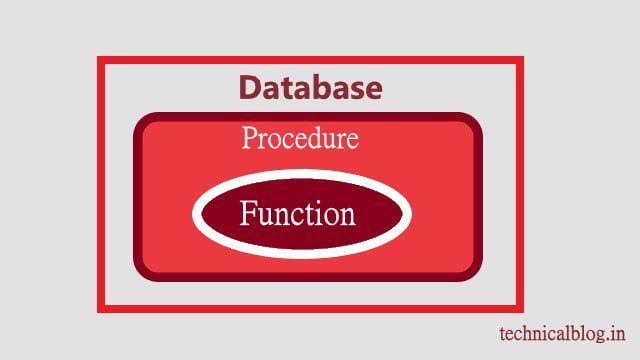Hi! Friends, We are back with the new content of Function in PL/SQL in Oracle PL/SQL Tutorial series. Please also read the previous post about Procedures in PL/SQL.
Let’s get started now…
The topics which will be covered in this tutorial:
- Introduction of Function
- Creating Function in PL/SQL
- Calling a function in PL/SQL
- Summary
- FAQS (Frequently Asked Questions)
Basic introduction of Function in PL/SQL
PL/SQL functions are not very different from PL/SQL Procedures. Only one difference is there that function is returning the values. So, what we learn in the previous article of PL/SQL Procedures, will also correct for function.
How to Create Functions in PL/SQL
We can create a PL/SQL function by using the CREATE FUNCTION statement. The syntax of the Creation of function is as follows −
CREATE [OR REPLACE] FUNCTION function_name
(parameter_name [IN | OUT | IN OUT] datatype [, ...])
RETURN return_datatype
IS
BEGIN
< body >
END [function_name];Syntax Explanation:
- Here, the function-name refers to the function’s name.
- Here, the [OR REPLACE] option allows us to modify the existing function.
- The parameter_name, as we already know which passes in the function. It can be input or output type or both IN OUT.
- The PL/SQL functions are must contain a return statement which returns the datatype.
- The body contains the executable part where we are doing the queries and other kinds of stuff.
- A Function can also return the value through OUT parameters other than using RETURN.
Example:
CREATE OR REPLACE FUNCTION functionExample
RETURN number
IS
vtotalno number() := 0;
BEGIN
SELECT count(*) into vtotalno
FROM virtualtable;
RETURN vtotalno;
END;
/ 
How to Call a Function in PL/SQL
When we are creating a function at that time, we know what the purpose of the function is. Where we are going to use that whether in standalone or somewhere in a procedure.
To call a function in the to declare block, we need to pass the necessary parameters among function_name, and if the function returns a value, we can store the value. The below- mentioned program calls the function example from an unnamed block −
DECLARE
vnumber number(10);
vtotalcost number(5);
BEGIN
SELECT t.cost into vtotalcost
FROM virtualtable t;
vnumber := totalempollyee();
if(vnumber > vtotalcost
) then
dbms_output.put_line('Total no. of empollyee: ' || vnumber);
end if;
dbms_output.put_line('Total cost. of empollyee: ' || vtotalcost );
END;
/To call a function in the to a procedure, we need to pass the necessary parameters through the function name, and if the function returns a value, then we can store the value. The below- mentioned example calls the function example −
CREATE OR REPLACE PROCEDURE printContact(
vcustomerid IN NUMBER default NULL;
)
IS
r_contact varchar2:=null;
vnumber number:=0;
BEGIN
SELECT t.contactno
INTO r_contact
FROM contacts t
WHERE t.customer_id = vcustomerid;
if( r_contact
= null) then
vnumber := totalCustomers();
end if;
EXCEPTION
WHEN OTHERS THEN
dbms_output.put_line( SQLERRM );
END;Summary
- Basic Introduction of Function in PL/SQL
- How to Create a Function in PL/SQL
- How to Call a Function in PL/SQL
- Calling a function in declare block
- Calling a function in a procedure.
FAQs:
What are the characteristics of Function?
A function can allow passing one or more than one parameter or no parameter.
What is a translate function in Oracle?
A translate function in PL/SQL executes a character-wise replacement of a string.
Can we use UPDATE FOR instead of rowid in SQL?
Yes, we can use UPDATE FOR for updating or inserting a row or value manually in the SQL query.
What is the Key difference between Function and Procedure?
A FUNCTION must always have a return statement which returns a value while a PROCEDURE can return one or more than values through parameters or can not return any.
In the above, we have discussed the Function in PL/SQL with suitable examples; also, we have mentioned some Faqs related to Oracle PL/SQL.
I hope you guys are like this one. For any query, please feel free to contact us.
Thank you 🙂